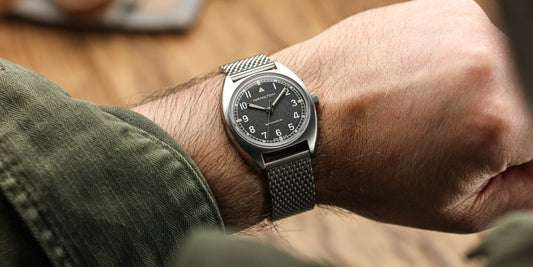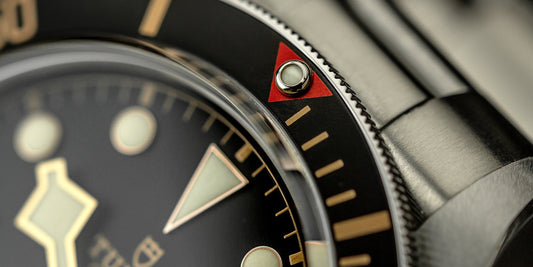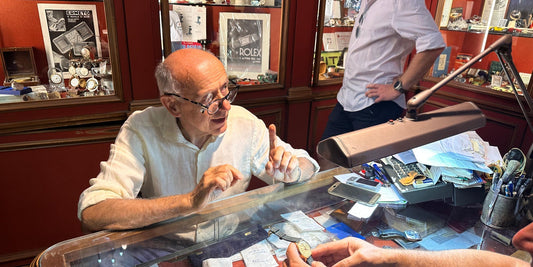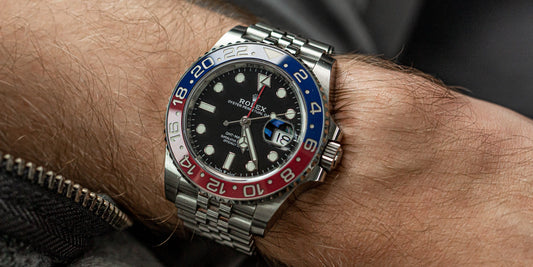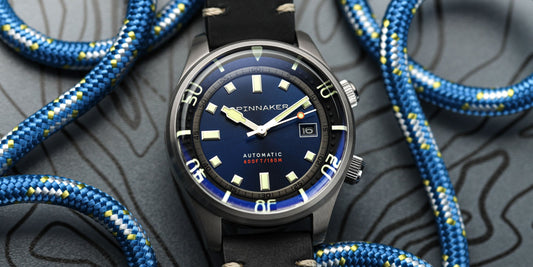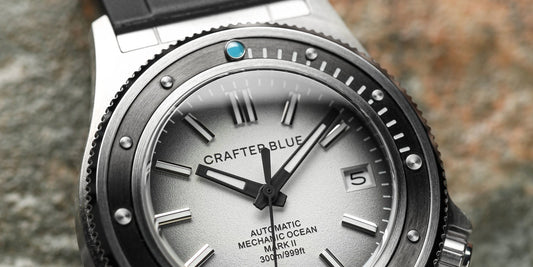One of the best-known auction houses for watches in the UK is Fellows, and here are just a few of the interesting gems we unearthed during a recent visit.
Kermit Submariner 16610LV

The most iconic watch in Rolex’s range is arguably the Submariner and the reference 16610LV is one of the most momentous examples, introduced in 2003 to mark its 50th anniversary, with production lasting only seven years. The anniversary edition introduced Rolex’s Maxi dial – with larger luminous hour markers – and the Kermit nickname (with the black eyes and green body of the Kermit the frog echoing the design of the watch). Leaving that aside, the 166170LV featured the same compact 40mm case as seen on other Submariner models along with 300m water resistance and Rolex’s own 3135.
After the Kermit was discontinued, it wouldn’t be seen again until the brand-new Submariner line-up in 2020, which included a green bezel and black dial Submariner, featuring a Cerachrom ceramic bezel insert. This was quickly nicknamed the ‘Cermit’, but what you see here is the original.
Timor Dirty Dozen WW2 watch

A lot has already been written about the ‘dirty dozen’ watches, commissioned by the British army to Army Trade Pattern (known as A.T.P) specification. These watches were often civilian watches slightly modified to meet the demands of the British Army. Twelve companies answered the call (including Timor, established in La Chaux-de-Fonds in 1923) and were selected, hence the dirty dozen nickname. Ironically, because the watches weren’t delivered until between May and December of 1945, it is unlikely that any of them saw any wartime use. But they lived on in for other missions and became part of military and watchmaking legend.
Around 13,000 of the Timor watches were made, which makes them one of the more distinctive finds these days, also because of the unique stepped case shape, which is different from that of other rounded cases that make up the dirty dozen.
Rolex Batman GMT

A modern legend, the Rolex Batman has its origins in the 2013 model of the GMT-Master II.
And the roots of that watch go back a lot earlier when it was designed in collaboration with Pan American Airways for use by professional pilots and navigators in the 1950s (the 'GMT' stands for 'Greenwich Mean Time’'). Various models have been released over the years (the GMT-Master also featured in the 1956 James Bond ‘Goldfinger’ film) but the most recent Batman is still the most sought after, nicknamed after Batman’s black and blue colours (which denote day and night on the ceramic bezel). The Batman had a makeover in 2019, featuring a new movement and a jubilee bracelet, as well as some other more subtle differences. But the purists insist that the 2013 model is the one to have.
Patek 5205G Annual Calendar

Introduced in 1996, the Annual Calendar quickly became one of Patek’s flagship complications, thanks to its increased user-friendliness, which means that the date needs adjusting only once a year (from February 28 or 29 to March 1, as opposed to five times a year, depending on whether the month has 30 or 31 days). Added to this were moon phases on the stunning 5205G model (which made its debut in 2010), with the end result being a watch that perfectly bridges traditional and modern, without ever losing the classic style (and price tag) that makes it unmistakeably a Patek. With a blue dial and white gold case it’s stunning to look at; this was replaced by the rose gold model in 2018. The word on the street is that this model may soon be discontinued, so now might be the right time to buy.
Cartier Rotonde de Cartier Mystérieuse

Cartier is as French as it gets, bringing an almost existential nature to time: a tradition that dates back to around 1912 when they introduced the first ‘mystery clocks’ that seemed to defy all logic. The mystery in this avant-garde watch stems from the hands that are seemingly floating in space and unattached to the movement, with the paradox being that an ethereal display such as this one – which on the face of it, champions artistic simplicity – can be linked to such a complex movement, which is required to make the mystery happen. Louis Cartier originally refused to explain how his mystery clocks work; on this manual-wind watch there’s a display case back, but it only lets you see what Cartier wants you to see. The mystery is still alive…

Hanhart is one of those German watch brands that’s exciting because it’s a piece of genuine watchmaking history, but not so many know what it’s all about. This WW2 German chronograph is a perfect example of that genre, making you wish that watches could talk. With the passage of time, it’s only to be expected that not a huge amount is known about it, but it’s likely to be of 1940s manufacture, with many of these watches issued to the Luftwaffe. Originally a Swiss company, Hanhart relocated to Germany in 1902, and from 1938 produced the Calibre 40, followed by the Calibre 41. Both were used by the German military and are now surprisingly affordable collectors’ items.




